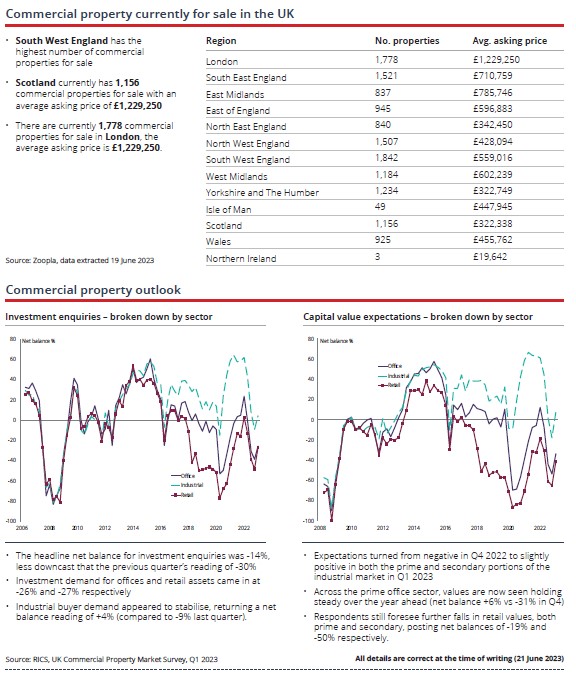Commercial Property Market Review – June 2023
Firms office space intentions over the next three years
A recent survey conducted by property consultant Knight Frank and Cresa, a commercial real estate firm, has highlighted that over the next three years, half of the biggest international employers (those with more than 50,000 employees) are anticipating reducing their global office space by between 10% and 20%.
This appears to be a direct result of the challenging post-COVID workplace. Of the 350 businesses surveyed, over half (56%) are choosing to adopt a hybrid approach to working, with 31% adopting an ‘office only’ or ‘office first’ approach. Only 12% of respondent firms are planning a fully flexible approach where staff would be mostly or entirely remote.
In the search for better quality office space, many organisations plan to move – leading to increased demand for higher quality and more sustainable office space. Global Head of Occupier Research at Knight Frank, Lee Elliott, commented on the future office space strategies of firms, “Now that we are in a truly post-pandemic world, corporate decision-makers are ‘removing the blinkers’ and making clear decisions around their future corporate real estate strategy based on a broader array of business issues than just the pandemic. Firms are looking to work their offices harder, but still offer some flexibility to staff.”
Interestingly though, the survey did show that of the smaller firms surveyed (up to 10,000 employees), 55% were expecting to increase their global office space.
UK Hotel transactional activity
According to the recently released ‘UK hotel market overview’ from leading hotel agency and investment property practice Avison Young Hotels, transactional activity this year has slowed, with Q1 2023 figures down 33% year-on-year. This slowdown has been attributed to ‘interest rate increases in response to high inflation and the increasing cost of debt.’
Despite the evident slowdown, strong demand for regional asset sales was a theme at the start of the year – the 232-room Queens Hotel in Leeds and the 201-room Grand Hotel in Brighton were snapped up for approximately £53m and around £60m respectively. Both locations have benefited from the increase in demand for domestic leisure following the pandemic and are key landmarks in both destinations.
London remains a core driving sub-market, exemplified by the recent acquisition of the Covent Garden Hotel for £55m, the highest per key (£948,000) for the property to date, reinforcing ‘the strength of the luxury boutique hotel sector.’ Other significant London sales this year include a 192-room hotel in Finsbury Park (£44.3m) and a 75-unit Native Bankside aparthotel (£41m).
Bank Rate increases are expected to prompt property owners to retain assets until the economy stabilises. It is anticipated that due to increasing financial and operating costs, some owners will have to sell or consolidate their portfolios and that ‘opportunistic cash buyers are circling in the hope that they may at last be able to secure distressed or underperforming assets at a discount.’

All details are correct at the time of writing (21 June 2023)
It is important to take professional advice before making any decision relating to your personal finances. Information within this document is based on our current understanding and can be subject to change without notice and the accuracy and completeness of the information cannot be guaranteed. It does not provide individual tailored investment advice and is for guidance only. Some rules may vary in different parts of the UK. We cannot assume legal liability for any errors or omissions it might contain. Levels and bases of, and reliefs from, taxation are those currently applying or proposed and a
